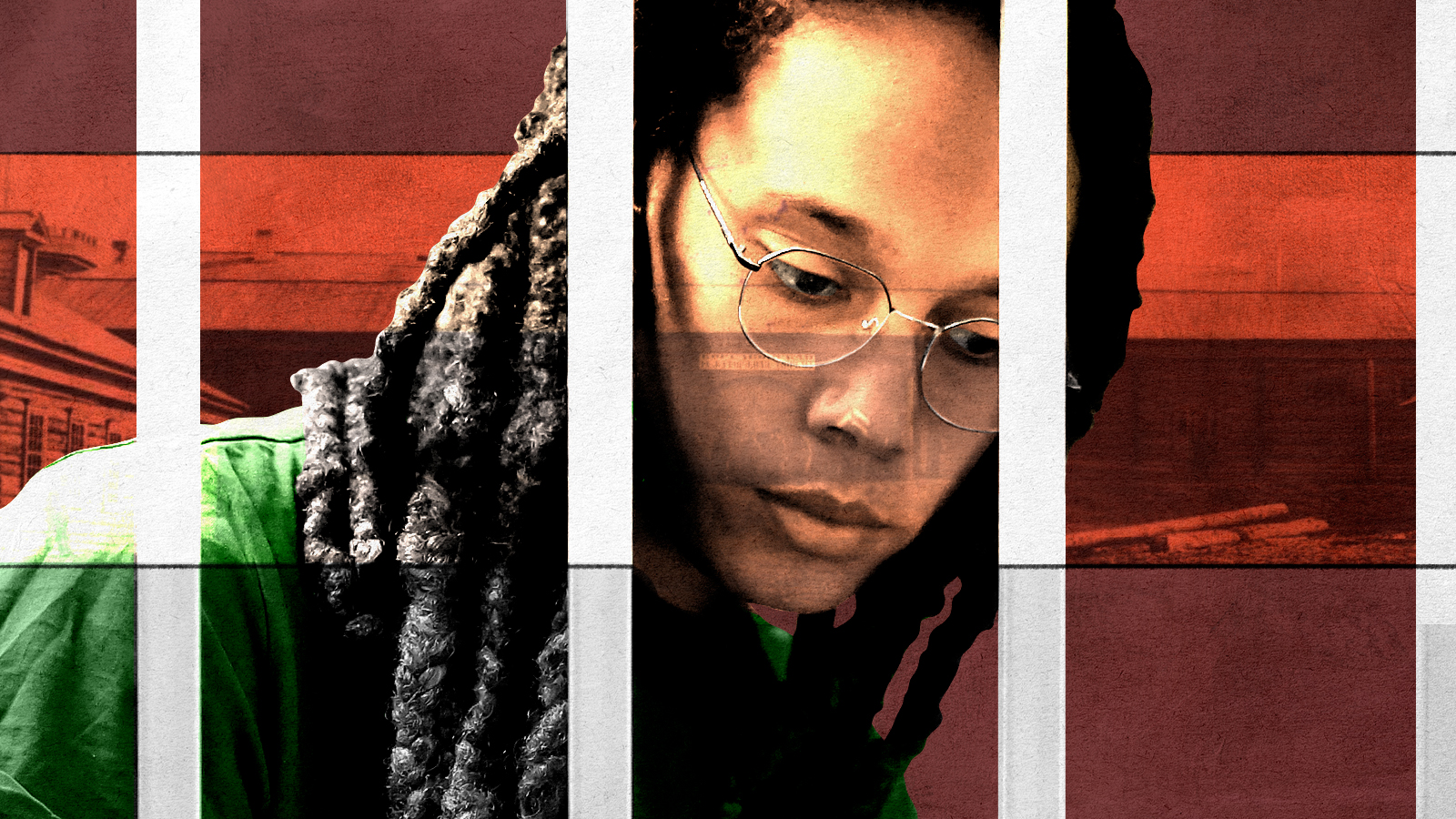What will life be like for Brittney Griner in a Russian penal colony?
The American basketball star could face 'grim' conditions


A free daily email with the biggest news stories of the day – and the best features from TheWeek.com
You are now subscribed
Your newsletter sign-up was successful
WNBA player Brittney Griner has been transferred to a Russian penal colony to serve a nine-year sentence following a drug conviction after authorities found a small amount of cannabis oil in her bag. While Russian authorities have gone to great lengths to keep the locations and operations of these colonies secret, the accounts of prior inmates, including some Americans, can help shed light on the conditions Griner might be facing.
What is a Russian penal colony?
It's essentially a labor camp. Inmates are usually forced to manufacture various Russian goods, mostly textiles, in sweatshop conditions. Sometimes they even make souvenirs and trinkets for tourists, ABC News reports. Instead of having individual cells, prisoners share barracks. The camps reportedly have varying levels of security — the more severe the crime, the harsher the security. This may not bode well for Griner, given that cannabis remains highly criminalized in Russia.
Where is Griner?
She has been transferred to a penal colony roughly 300 miles southeast of Moscow, per Reuters. According to her lawyers, Griner was taken to Female Penal Colony IK-2 in the town of Yavas in Russia's Mordovia region.
The Week
Escape your echo chamber. Get the facts behind the news, plus analysis from multiple perspectives.

Sign up for The Week's Free Newsletters
From our morning news briefing to a weekly Good News Newsletter, get the best of The Week delivered directly to your inbox.
From our morning news briefing to a weekly Good News Newsletter, get the best of The Week delivered directly to your inbox.
"We can confirm that Brittney began serving her sentence at IK-2 in Mordovia. We visited her early this week," Griner's lawyers said in a Nov. 17 statement. "Brittney is doing as well as could be expected and trying to stay strong as she adapts to a new environment."
Griner was first transferred out of a detention center on Nov. 4. On Nov. 9, her legal team told CNN she was "on her way" to a penal colony, but they had no information on her whereabouts. They were hoping to "be notified upon her arrival at her destination" in the coming weeks, they added.
What is life like on the inside?
It can vary from colony to colony, depending on location, leadership, and the perceived severity of the crimes committed by the prisoners within, Insider reports. In more lenient colonies, prisoners are housed in larger barracks and often allowed to move freely, according to a report from the Center for Eastern Studies. Some colonies even let prisoners leave on short trips, meet with their families, and wear their own clothes.
But life in the stricter colonies is, by many accounts, "hell." A report from Radio Free Europe describes the conditions at IK-14 women's facility in Mordovia, one of the most notorious and feared camps in the country. Prisoners are forced to endure "slave labor conditions." One former prisoner, Pussy Riot member Nadezhda Tolokonnikova, said they were forced to work up to 17-hour days with just a single day off every eight weeks. Another former inmate, Gelena Alekseyeva, called the conditions "medieval," and recalls the dangers of working in the sewing shop: "The saw cuts the fabric along a chalk line continuously. God forbid, if the saw cuts somewhere else ... I can say that fingers on the saw are chopped off, cut, blood flows." The guards would reportedly burn kittens alive in furnaces in order to demoralize the prisoners, and at the end of the day, Alekseyeva added, the inmates would return to barracks infested by rats and rodents.
A free daily email with the biggest news stories of the day – and the best features from TheWeek.com
Most of the colonies are overcrowded and unsanitary, according to a 2021 report from the U.S. State Department. Problems with running water and heat are common, which can make for brutal conditions in the frigid Russian winters, and prisoners are often transported in "windowless railroad carriages known as Stolypin cars."
Does Griner face these kinds of conditions?
Well, IK-2 is seemingly no walk in the park. A 2017 article from Russian newspaper Moskovsky Komsomolets described the colony as featuring "widespread torture, harsh beatings, and slave labor conditions," per a summary from The New York Times. Moreover, former IK-2 inmates said they would often work for over 12 hours and were not allowed to use a washroom.
That said, Griner may be high-profile enough of a prisoner to escape some of the most horrific treatment, notes ABC News. That's because Russia might want to use her as a bargaining chip. Her celebrity and her American citizenship could also help protect her from other prisoners, Russian prison sociologist Olga Zeveleva tells Vice News, adding that the prison administration would likely keep a close watch on Griner.
Paul Whelan, a former U.S. Marine who, like Griner, is being held prisoner in a Russian penal colony in Mordovia, told the outlet the conditions were "Dickensian," "grim," and "dilapidated." He added that prisoners were forced to share just a few toilets, and were only allowed to shower once or twice per week. The rest of the time, the camp had no hot water, and medical treatment in the often-freezing colony was minimal, Whelan added.
What is Putin's role?
Russian President Vladimir Putin has been noticeably mum about the conditions of Griner's detainment. He has sent a number of his own critics, including many in the media, to penal colonies when they have spoken out against him. Prominent Kremlin opponent Alexei Navalny is currently imprisoned for expressing his views against the president. While the Biden administration has asserted it wants to bring Griner home, a senior aide to Putin described the issue as "not a priority" for the Russian president.
Update Nov. 18: This article has been updated to reflect new information regarding Griner's whereabouts.
Justin Klawans has worked as a staff writer at The Week since 2022. He began his career covering local news before joining Newsweek as a breaking news reporter, where he wrote about politics, national and global affairs, business, crime, sports, film, television and other news. Justin has also freelanced for outlets including Collider and United Press International.
-
 The Week Unwrapped: Have televised confessions quelled protests in Iran?
The Week Unwrapped: Have televised confessions quelled protests in Iran?Podcast Plus, why has Elon Musk turned from Mars to the Moon? And will the BBC prove to be a puzzles champ?
-
 The week’s best photos
The week’s best photosIn Pictures An Andean god, a rogue squirrel, and more
-
 AI surgical tools might be injuring patients
AI surgical tools might be injuring patientsUnder the Radar More than 1,300 AI-assisted medical devices have FDA approval
-
 Has geopolitical wrestling overshadowed the Olympics?
Has geopolitical wrestling overshadowed the Olympics?Today's Big Question Global political tensions and culture war issues have loomed large in Paris
-
 An early look at the college football national champion contenders
An early look at the college football national champion contendersThe Explainer What school could come out on top of the FBS this coming January?
-
 Why baseball's new rules rule
Why baseball's new rules ruleSpeed Read Attendance and viewership have gone up while average game time has gone down
-
 Women's World Cup athletic kits have upped their fashion game
Women's World Cup athletic kits have upped their fashion gameSpeed Read Major brands are embracing gender-neutral and size-inclusive clothing
-
 The fight for equal pay
The fight for equal paySpeed Read The Women’s World Cup is the largest women’s tournament ever, but the athletes are still fighting to share in its success
-
 Saudi Arabia's big sports bet
Saudi Arabia's big sports betSpeed Read The recent PGA-LIV Golf merger is just the tip of this oil-funded iceberg
-
 Who will win the 2023 FIFA Women's World Cup?
Who will win the 2023 FIFA Women's World Cup?The Explainer The global tournament has kicked off in New Zealand
-
 Why the PGA Tour is merging with LIV Golf
Why the PGA Tour is merging with LIV GolfThe Explainer The groups are controversially coming together after a rocky relationship
